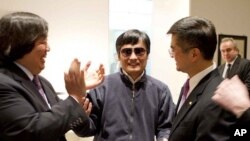Chen Guangcheng, the blind Chinese legal activist whose case has become a high-profile diplomatic challenge to both China and the United States, told VOA Friday that a high-ranking government official told him that as long as his public comments on his situation are accurate, his situation will be handled according to the law.
Chen, who recently escaped from house detention and sought refuge in the U.S. embassy in Beijing, talked to VOA on a cell phone. He said for the first time the Chinese government responded openly about the persecution he and his family say they have suffered.
"Last night the government dispatched a fairly high level departmental official to understand what exactly happened in Shandong," Chen said. "They also brought me a bouquet of lilies and carnations. I was very happy they were able to come."
Chen became famous as a self-taught lawyer who challenged local authorities in court on human rights abuses, particularly on the issue of forced abortions and sterilizations under China’s one-child population policy. He served four years in prison. After he was freed in 2010, security personnel kept him confined to his family’s farmhouse in Linyi, Shandong Province.
He is now in a hospital, being treated for injuries he suffered during his escape. Chen said he pushed the Chinese official who visited him for greater protections.
"I furthermore demanded that they immediately order everyone to stop all criminal violations on my family, guarantee all my civil rights, carry out a complete investigation on everything that happened in Shandong, and also openly handle the case," he said.
Chen’s case has overshadowed long-scheduled high level meetings between the United States and China in Beijing. He took shelter in the U.S. embassy just days before U.S. Secretary of State Hillary Clinton and Secretary of the Treasury Timothy Geithner arrived in Beijing for long-scheduled meetings.
While he was in the embassy, Chen’s friends all said he wanted to remain in China and uphold fairness and justice. On Wednesday, Chen left the embassy, after U.S. officials said they had received assurances from Chinese authorities that Chen would be allowed to relocate his family to Beijing and he would be free to attend university there.
Within a day, it appeared Chen had second thoughts. On Friday he told VOA he wanted to leave the country.
"To leave China, I want to rest for a while. Or receive medical treatment, and so on, because ultimately there are security issues," Chen said. "I still do not know my family’s situation. I am unable to contact my brothers. I am unable to contact my family."
He said his family’s confinement was intensified after his escape. His older brother, Chen Guangfu, was detained by local security forces. Mr. Chen’s nephew, who allegedly attacked a local official who broke into their house, is missing.
Chen said security forces have tightened their control over his home. "In my courtyard they have installed seven cameras. They have prepared electrified wire netting and mesh wire netting around my house. I think this is very, very difficult to comprehend. All these actions show that the U.S.-China agreement is being poorly carried out. It is probably because this agreement is unprecedented," he said.
When Chen left the embassy on Wednesday, U.S. Ambassador Gary Locke, U.S. Assistant Secretary of State Campbell and other American officials accompanied him to the hospital, where he was reunited with his wife and children.
Chen is still in the hospital. "My foot is fractured, and there's a cast on it," he said. "I'm lying in bed and it's not easy to move. The complete results of my physical examination have not yet come out. I had a colonoscopy yesterday morning, and the results of the biopsy aren't out yet. I'm waiting for the results now. This is the situation with my overall health."
Chen had to end the phone call then, because a doctor entered his room. But he took one last moment to express his hopes that the media and the public could pay attention to the safety of his rescuer, He Peirong, and others who helped him.
He Peirong was taken into custody after she helped Chen escape. Other activists who have gone to see him in the hospital or have supported him have reported being detained or beaten by security officials.
On Friday, China’s government said Chen is free to apply to study abroad, signaling a possible breakthrough in a diplomatic dispute over his fate.
Secretary of State Hillary Clinton told reporters in Beijing Friday that she sees progress in the Chen case, and is "encouraged" by the latest Chinese position.
The State Department said the U.S. expects that the Chinese government will expeditiously process Chen’s applications for travel documents, and that the U.S. will give Chen’s visa request priority attention.
The State Department also announced that Chen has been offered a fellowship at a U.S. university that would allow him and his family to travel to the United States.
Guo Yushan, a supporter who helped hide Chen in Beijing, said the activist has a letter from New York University offering him a fellowship to study there.




